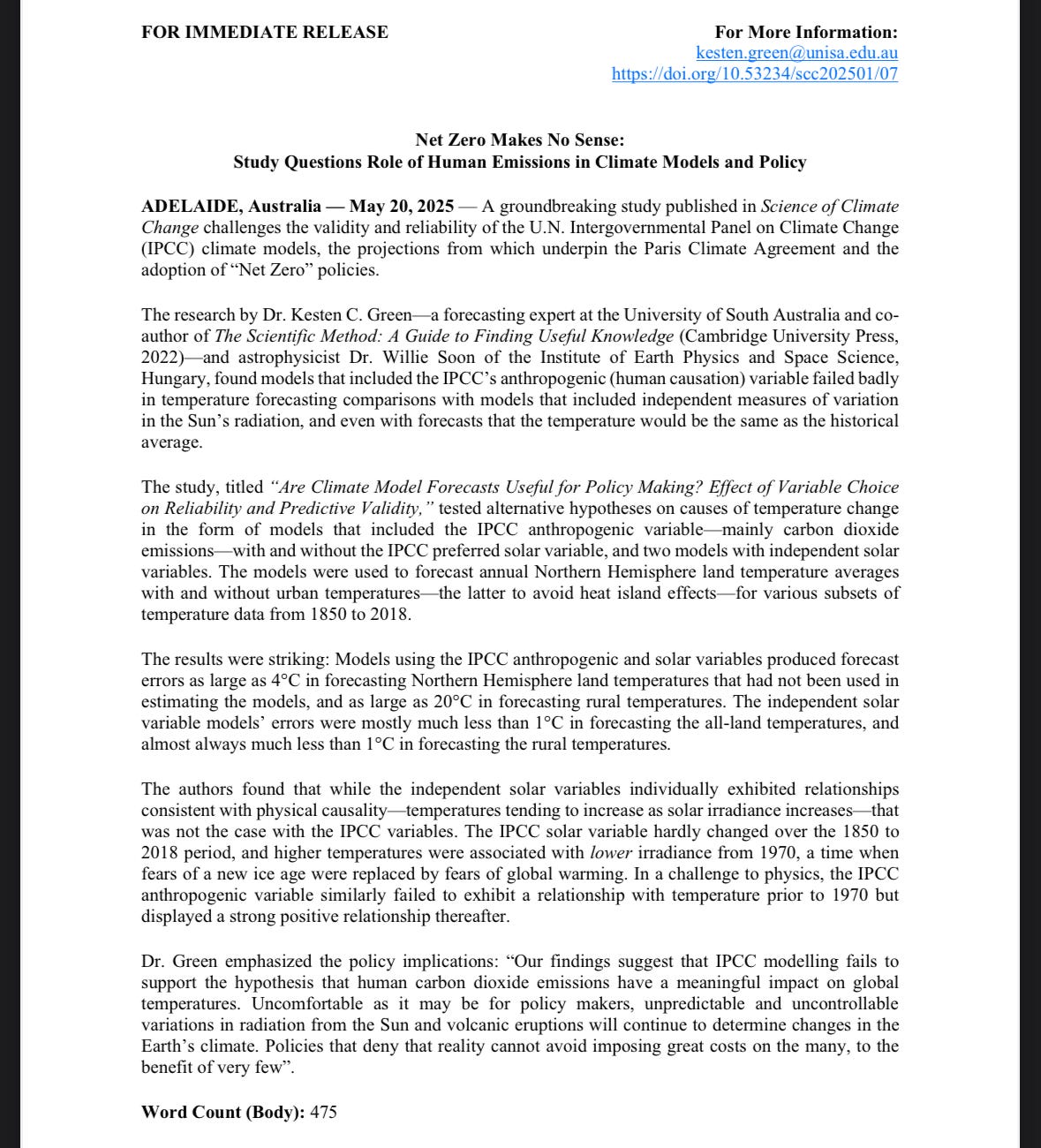𝐒𝐜𝐢𝐞𝐧𝐜𝐞 𝐔𝐧𝐬𝐞𝐭𝐭𝐥𝐞𝐝: 𝐍𝐞𝐰 𝐒𝐭𝐮𝐝𝐲 𝐔𝐧𝐝𝐞𝐫𝐦𝐢𝐧𝐞𝐬 𝐍𝐞𝐭 𝐙𝐞𝐫𝐨 𝐌𝐨𝐝𝐞𝐥𝐬 𝐚𝐧𝐝 𝐁𝐨𝐥𝐬𝐭𝐞𝐫𝐬 𝐂𝐚𝐥𝐥𝐬 𝐟𝐨𝐫 𝐂𝐨𝐮𝐧𝐜𝐢𝐥 𝐀𝐜𝐜𝐨𝐮𝐧𝐭𝐚𝐛𝐢𝐥𝐢𝐭𝐲
Municipalities across Canada are increasingly questioning costly, top-down Net Zero climate frameworks—and a new peer-reviewed study has just given them more scientific ground to stand on.
A May 2025 paper published in Science of Climate Change, led by forecasting expert Dr. Kesten Green and astrophysicist Dr. Willie Soon, reveals what many local residents have suspected for years: IPCC climate models used to justify U.N.-driven Net Zero policies—including those advanced by the Federation of Canadian Municipalities (FCM), ICLEI, and the Partners for Climate Protection (PCP)—may be fundamentally unreliable.
➡️𝐓𝐡𝐞 𝐟𝐢𝐧𝐝𝐢𝐧𝐠𝐬 𝐚𝐫𝐞 𝐬𝐭𝐚𝐫𝐭𝐥𝐢𝐧𝐠: Models relying on the IPCC’s “human emissions” variable showed massive errors—up to 20°C in some historical forecasts. Meanwhile, models using solar and natural factors—excluded by most Net Zero frameworks—consistently matched historical data within a narrow 1°C range.
This means that the so-called “settled science” justifying carbon pricing, GHG tracking, and rural land-use restrictions is far from settled. The report found that IPCC-style models were unable to establish a meaningful causal relationship between human carbon dioxide emissions and rising temperatures—especially prior to 1970. Instead, solar irradiance and other natural variables showed a much stronger correlation.
🛑 For Canadian municipalities, this reinforces growing concerns about being bound to international programs with major financial and policy implications—without scientific certainty, local consultation, or democratic consent.
The FCM and ICLEI’s climate programs routinely encourage towns to sign onto aggressive “net-zero by 2050” targets, implement carbon audits, and access funding tied to emission reductions. But this study undercuts the entire premise that these emissions targets are empirically grounded. If the models behind Net Zero are broken, why are our municipalities still expected to obey them?
Dr. Green’s conclusion is clear: “Policies that deny that reality cannot avoid imposing great costs on the many, to the benefit of very few.” This echoes what many small-town leaders and rural residents already feel—climate policy is being used to centralize power, restrict economic development, and bypass local autonomy in favour of global compliance.
✅ 𝐓𝐡𝐞 𝐜𝐚𝐥𝐥 𝐭𝐨 𝐚𝐜𝐭𝐢𝐨𝐧 𝐢𝐬 𝐜𝐥𝐞𝐚𝐫: Councils must pause, reflect, and reassert their constitutional jurisdiction. Local governance means informed decision-making—not blanket adherence to UN-mandated targets or FCM programming that prioritizes ideology over evidence.
If you're a councillor, staff member, or citizen ready to defend local governance, now is the time to:
📄 Request a review of all FCM/PCP/ICLEI commitments made by your municipality.
🗳️ Table a resolution for withdrawal or non-renewal.
🧾 Demand transparency on all climate-related funding agreements and model assumptions.
✍️ Share this research with your local council and media.
Municipal decisions must serve local needs, not global agendas.
🔗 𝐋𝐞𝐚𝐫𝐧 𝐦𝐨𝐫𝐞 𝐚𝐧𝐝 𝐠𝐞𝐭 𝐢𝐧𝐯𝐨𝐥𝐯𝐞𝐝: www.kiclei.ca





